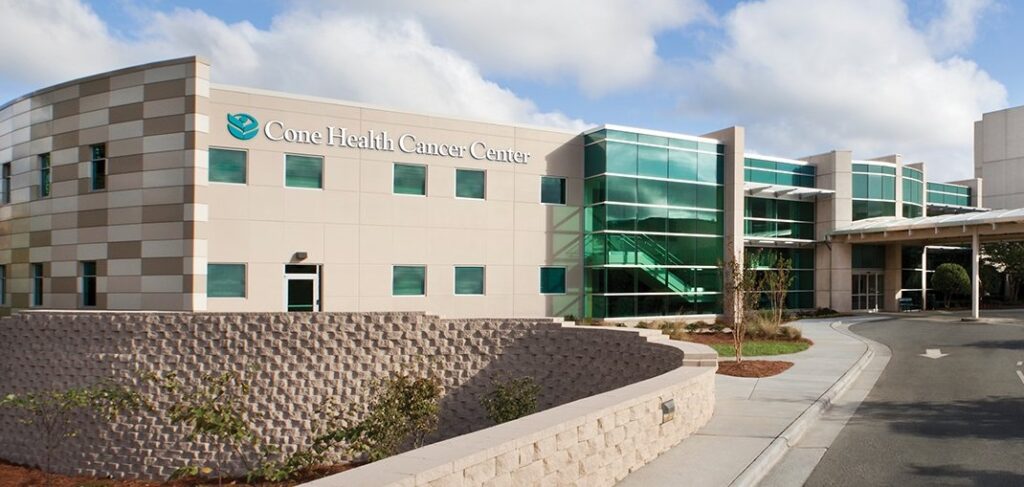
Our Cancer Center Showcase continues this month with Cone Health, located in the Piedmont Region of North Carolina. Cone Health is one of the leading health systems in the Piedmont region of North Carolina, continuing to grow tremendously. They have added two cancer care campuses to their Cancer Program within the last two years, making a total of six campuses that offer cancer care in the triad region.
The cancer registry is called the Oncology Informatics team, which better represents the work that the team does each day. The team is led by Joanne Essick, BA, ODS-C, the System-Wide Manager of Oncology Informatics. There is a total of six full-time and one part-time ODS-Cs. The entire team works remotely with an administrative assistant on-site to help as needed. The team reports to the Oncology Service Line.
Eighty-seven percent of all annual cases are analytic with close to 5000 cases being accessioned annually. The cancer program at Cone Health has been Quality Oncology Practice Initiative (QOPI) certified since 2007. The QOPI Certification Program™ provides a three-year certification recognizing high-quality care for outpatient hematology-oncology practices within the United States and certain other countries. Practices receive QOPI Certification based on their full compliance with the QOPI Certification Standards as assessed during an on-site survey.
QOPI is a voluntary program to help medical oncology and hematology/oncology practices evaluate the quality of the care they provide to patients. Data are collected and compared to more than 100 quality measures (aspects of care based on published care recommendations and expert opinion).
Annually, the Oncology Informatics team does QOPI-criteria casefinding and abstracting to maintain certification. In 2022, Cone Health went live with CancerLinQ which replaced the manual casefinding and abstracting process for all but one facility.
The team helps support Cone Health’s 13 tumor boards, which are all remote. The tumor boards consist of Breast, GI, Head and Neck, Thoracic, Brain and Spine, GYN Onc, Hematology, Prostate, Urology, and Melanoma/Sarcoma of all locations. Essick says that the role of the team varies by conference but can include Webex creation, patient list generation, attendance tracking and case documentation. A major annual project is the creation and submission of CME applications for 10 of the conferences, which include at least 30 data reports to support conference goals and objectives.
In addition to administration and clinical data requests, Essick states that the registry gets an abundance of data requests from their oncology partners, such as research, genetics, patient navigation, survivorship, patient support services and community outreach departments. They love to see their data being used and continue to expand their reporting.
Cone Health is committed to ensuring that all their patients receive the best treatment possible, regardless of their race, ethnicity, or gender. Their data has been used to support several projects reviewing racial disparities with results shared locally and nationally.
Automating processes is extremely important and beneficial to the Cone Health cancer team. Currently utilized automated processes include a monthly casefinding import from their Epic EMR system, an import from their pathology system, as well as an import to update follow-up from Redsson. Essick states that automating these processes have really increased productivity and efficiency by decreasing time spent conducting manual reviews and entries. Automation has also made edit checks much easier.
When asked how automation may affect the registry in the future, Essick states that she only sees this getting better and more efficient. She does not worry about automation replacing registrars since the review and analysis of the data relies on the expertise of ODS-Cs. Essick looks forward to further advances with AI and NLP, which will help the registry free up time for all their other important duties such as quality assurance and data analytic needs.
Additionally, Essick comments that over the past few years, the team has developed and maintained a strong, adaptable QI program. The whole team engages in discussing education events and publications which lead to topics for baseline data reviews to assess a need for more in-depth investigation. The entire team is committed to quality work and continuous learning.
Essick has been a CRStar client since 2007, beginning at Alamance Regional Medical Center which then merged with Cone Health in 2013 when the team converted from their legacy software to CRStar. When asked about support and educational services from CRStar, Essick states, “The support time is very quick to respond, and it is always very helpful having quick resolutions with support issues.” The Cone Health team enjoys the educational webinars provided and feel that the topics are very useful. Additionally, Essick appreciates CRStar’s commitment to support through listening and continuous improvement, as well as the support staff’s understanding of the ins and outs of the cancer team space. Essick fondly recalls working hand in hand every day with support to make her first CRStar NCDB submission of 30,000 cases happen successfully!
Since Cone Health has so many data requests, Essick appreciates the vast reporting capabilities of CRStar and looks forward to mastering the new and enhanced reporting modules. Essick states, “Seeing our data being used to benefit the many areas of the cancer program, our patients and the community really connects us to our roles as ODS-Cs.”
When asked about the team, Essick adds, “The Oncology Informatics team at Cone Health is the best!! Over the past 16 years, we have been able to support many clinical students on their road to becoming ODS-Cs. Several of these folks are now part of our close-knit, smart and adaptable team. We’ve missed seeing our fellow North Carolina ODS-Cs and CRStaff staff in person over the past few years. Hopefully, we’ll all get a chance to re-connect at our state meeting this fall.”